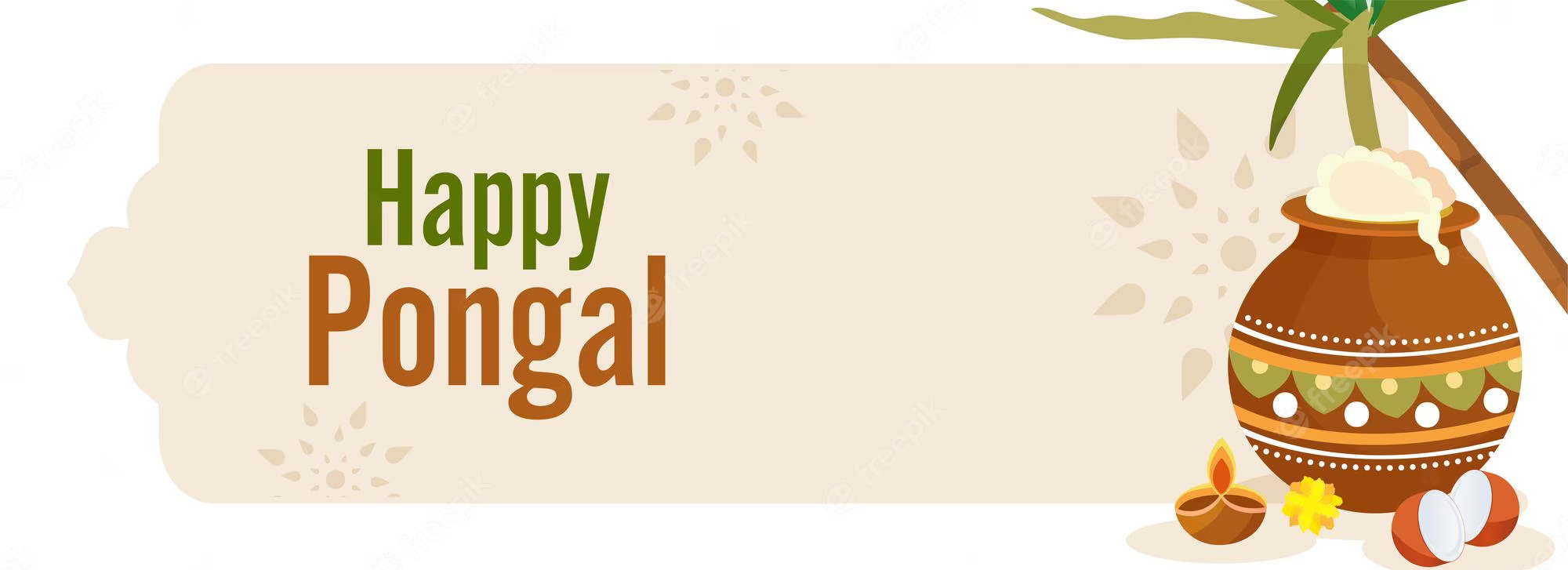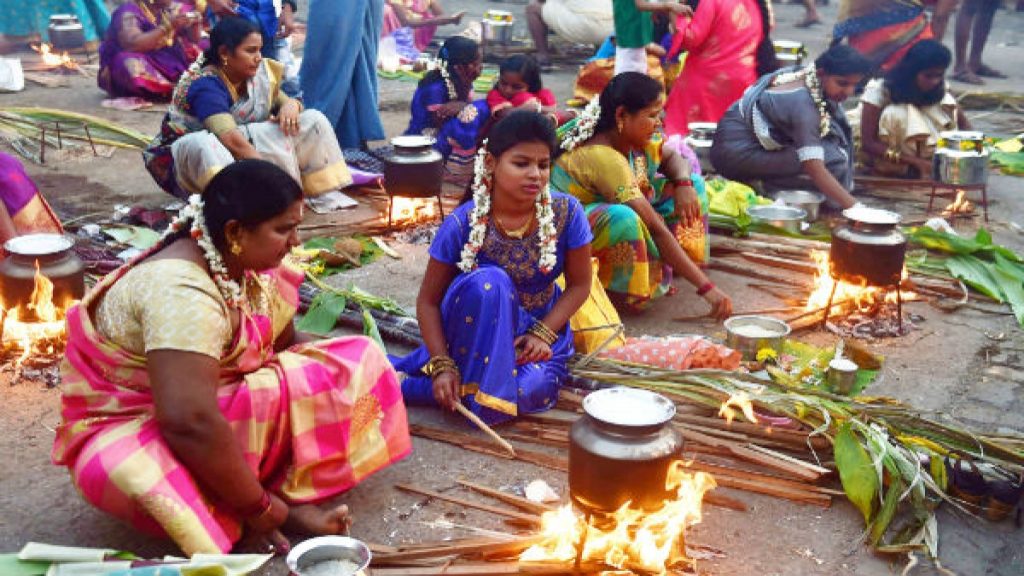- Private car and driver in Delhi / India
- +91-8447445445
- info@discoverindiabycar.com sugar.ankit@yahoo.com
 +91-9818434712
+91-9818434712
Pongal Festival

Pongal, also known as Thai Pongal, is a several-day Hindu harvest festival that Tamil people in India and Sri Lanka celebrate. According to the Tamil solar calendar, it is observed at the beginning of each month. Depending on the year’s sun’s orbit of the earth, this festival is typically observed on January 14 or 15. It coincides to Makar Sankranti, the harvest festival honouring the sun god Surya that is celebrated throughout India under a number of regional names. The three days of the Pongal celebration are known by the titles Bhogi Pongal, Surya Pongal, and Mattu Pongal. Some Tamils celebrate Kanum Pongal on the fourth day of Pongal.
An occasion to rejoice
The Uttarayana festival, also known as the end of the winter solstice and the beginning of the sun’s six-month journey north, is thought to mark these events. The ceremonial word “Pongal,” which refers to the traditional dish of fresh harvest rice cooked in milk with jaggery and means “to boil, overflow,” is whence the event gets its name (raw sugar).
The gods and goddesses, including Surya, are first given the pongal dish, which is prepared to remember the celebration. The Madu cow is worshipped at the Mattu Pongal festival. Cows are bathed, have their horns painted, and have flower garlands put around their necks. The pongal is fed to the cattle after being offered to the gods and then enjoyed by the family. Festive celebrations sometimes include parades, ritual bathing, and decorating cows and their horns. In order to improve social bonds, it is usual to use this time to decorate rice-powder-based artworks called kolams, perform prayers in the home and temples, spend time with family and friends, and exchange gifts.

It coincides to Makar Sankranti, the harvest festival honouring the sun god Surya that is celebrated throughout India under a number of regional names. The three days of the Pongal celebration are known by the titles Bhogi Pongal, Surya Pongal, and Mattu Pongal. Some Tamils celebrate Kanum Pongal on the fourth day of Pongal. It coincides to Makar Sankranti, the harvest festival honouring the sun god Surya that is celebrated throughout India under a number of regional names. The three days of the Pongal celebration are known by the titles Bhogi Pongal, Surya Pongal, and Mattu Pongal. Some Tamils celebrate Kanum Pongal on the fourth day of Pongal.
The festival's days
A home decorated for the Pongal holiday in Kanchipuram, Tamil Nadu. In Tamil Nadu, the festival is observed for three or four days, but just for one or two days in urban areas, especially outside of South Asia and among the Tamil diaspora.
Pongal Festival Types

The Bhogi Pongal
The final day of the Tamil month of Marghali, known as Bhogi Pongal, is when the Pongal festival officially kicks off.On this day, individuals get go of their old stuff and enjoy getting new ones. To burn the mountains of trash, the people gather and start a campfire. To give a festive appearance, houses are cleaned, painted, and adorned. In villages, buffalo and cow horns are painted. To signal the beginning of the event, new clothing is worn. The day’s deity is Indra, the rain god, to whom prayers are paid in appreciation and in anticipation of a year of copious precipitation.
Surya Pongal
For Pongal, kolam floor artwork is used to decorate homes and streets. The second and biggest celebratory day is Surya Pongal, also known as Suryan Pongal or Perum Pongal, which is devoted to the sun god. It is also Makara Sankranthi, an Indian winter harvest festival, which falls on the first day of the Tamil calendar month Tai. When the sun enters the zodiac’s Makara, the 10th house, on this day, the Uttarayana begins. The Pongal dish is prepared in a traditional earthen pot in a public area with the sun in view as part of the day’s festivities with family and friends. A turmeric plant or flower garland is frequently tied around the pot as decoration, and two or more long, fresh sugarcane stalks are usually placed close to the cooking fire.
Mattu Pongal
The day following Surya Pongal is dedicated to Mattu Pongal celebrations. Mattu means “cow, bullock, cattle,” and Tamil people, regardless of their religious beliefs, value cattle as a source of prosperity since they provide dairy products, fertiliser, transportation, and agricultural support. Cattle are dressed for Mattu Pongal, sometimes with flower garlands or painted horns, given bananas and a special supper, and revered. Some people use manjalthanni (turmeric water and oil) to adorn their cows. Shikakai paint their horns, cover their foreheads in kungumam (kumkum), and feed them a concoction of venn pongal, jaggery, honey, banana, and other fruits. Some give their cattle a wash and bow down before them to thank them for their assistance with the harvest.
Kanum Pongal
Community processions for Pongal, festive attire, and dance performances. The fourth day of the festival, known as Kanum Pongal or Kanu Pongal, signals the conclusion of the Pongal celebrations for the year. In this context, the term kanum means “to visit.” On this day, several family reunions take place. Social gatherings are planned by communities to improve ties amongst members. During social events, villagers cut and enjoy farm-fresh sugarcane. While children go out to see seniors in their neighbourhoods and among their relatives to pay respects and seek blessings, some elders offer the visiting children some pocket change as a gift. Relatives, friends, and neighbours come to say hello.
Pongala in Kerala
The celebration is known as Pongala in Kerala, a state that, according to Sangam literature, has a long history of cultural contact with Tamil people thanks to the Chera kingdom. In Kerala, communities practise traditions such as cooking a milk-rice-jaggery feast, going on social outings, and showing respect for cattle. It coincides with Tamil Pongal and is a brief state holiday in Wayanad, Idukki, Pathanamthitta, Palakkad, and Thiruvananthapuram districts.
Community Pongal
Pongal at Singalandapuram during “Mup poosai”. Families congregate for ceremonial worship at the community pongal. Starting with picking out the pot, lighting the fire, and other actions, it becomes a significant component of worship. Bananas, coconuts, and sugarcane sticks are also available.








